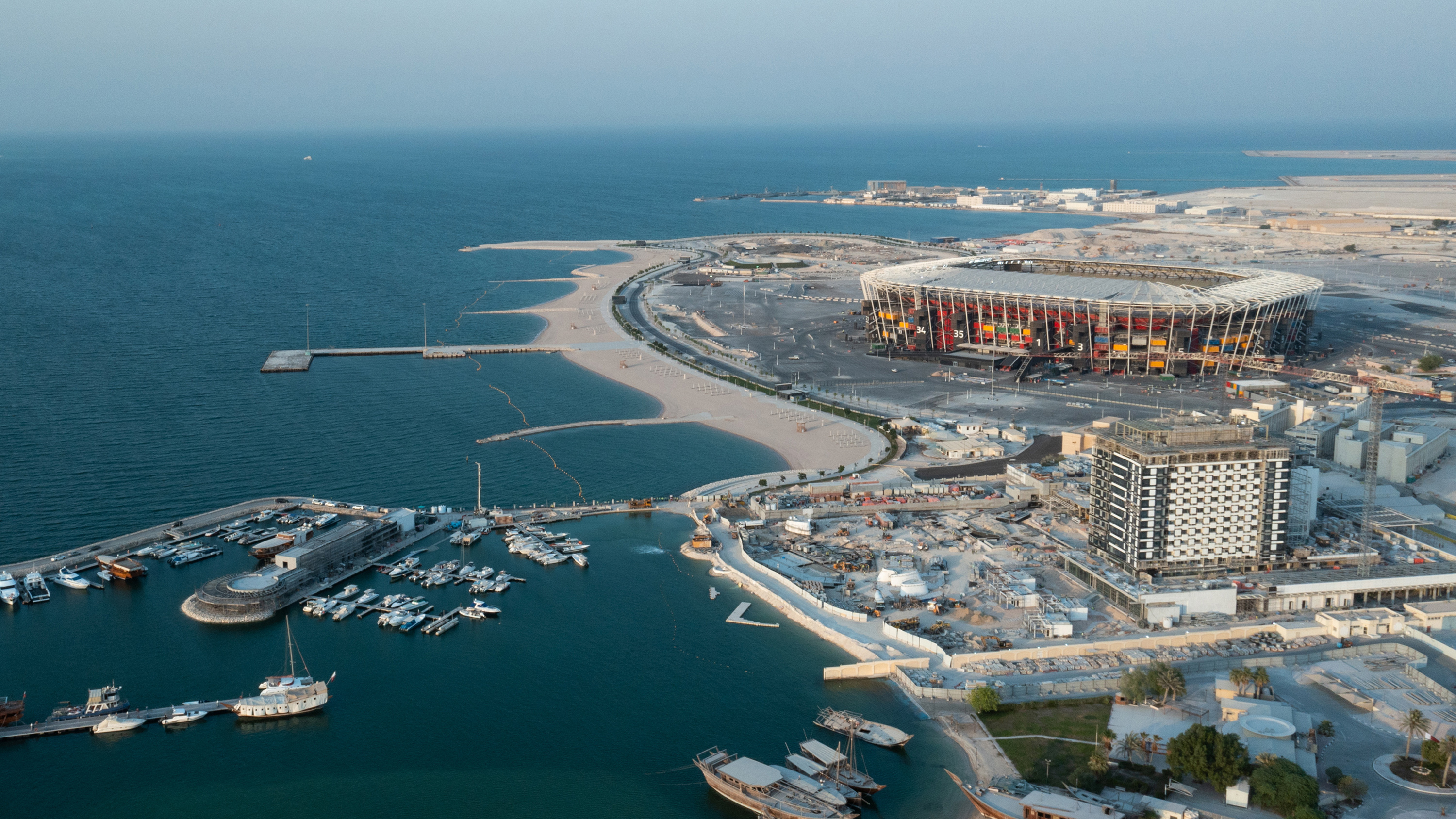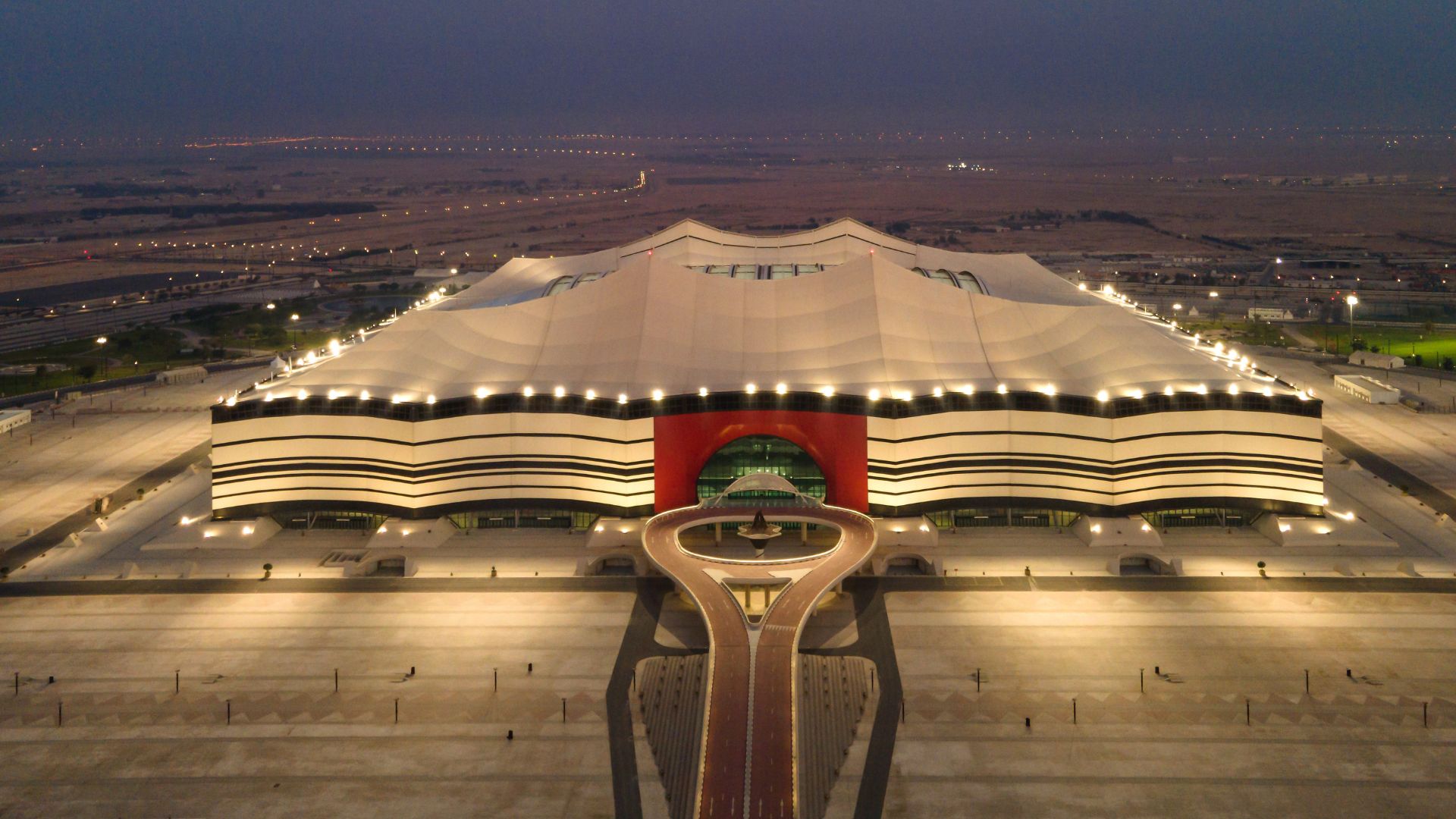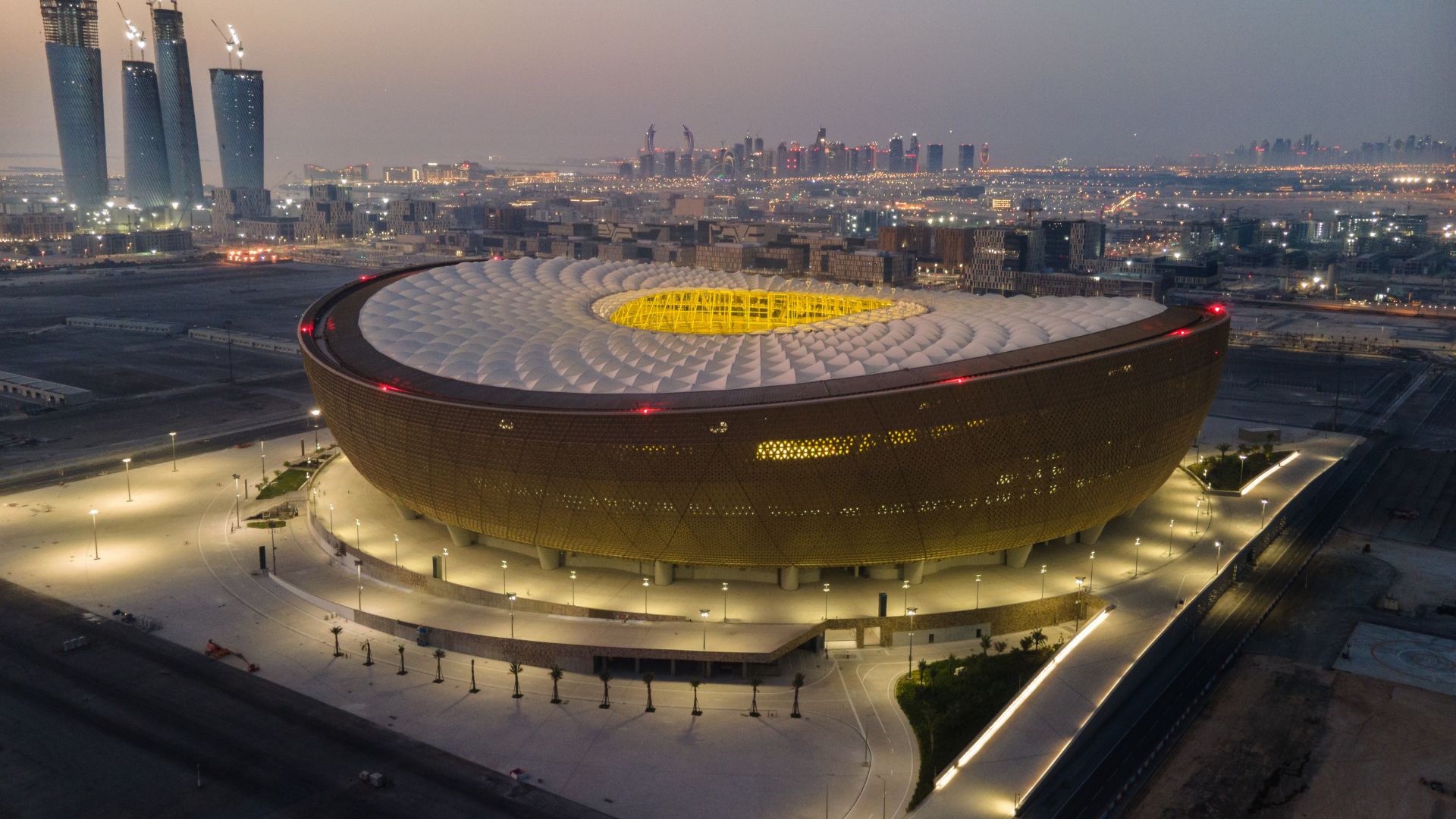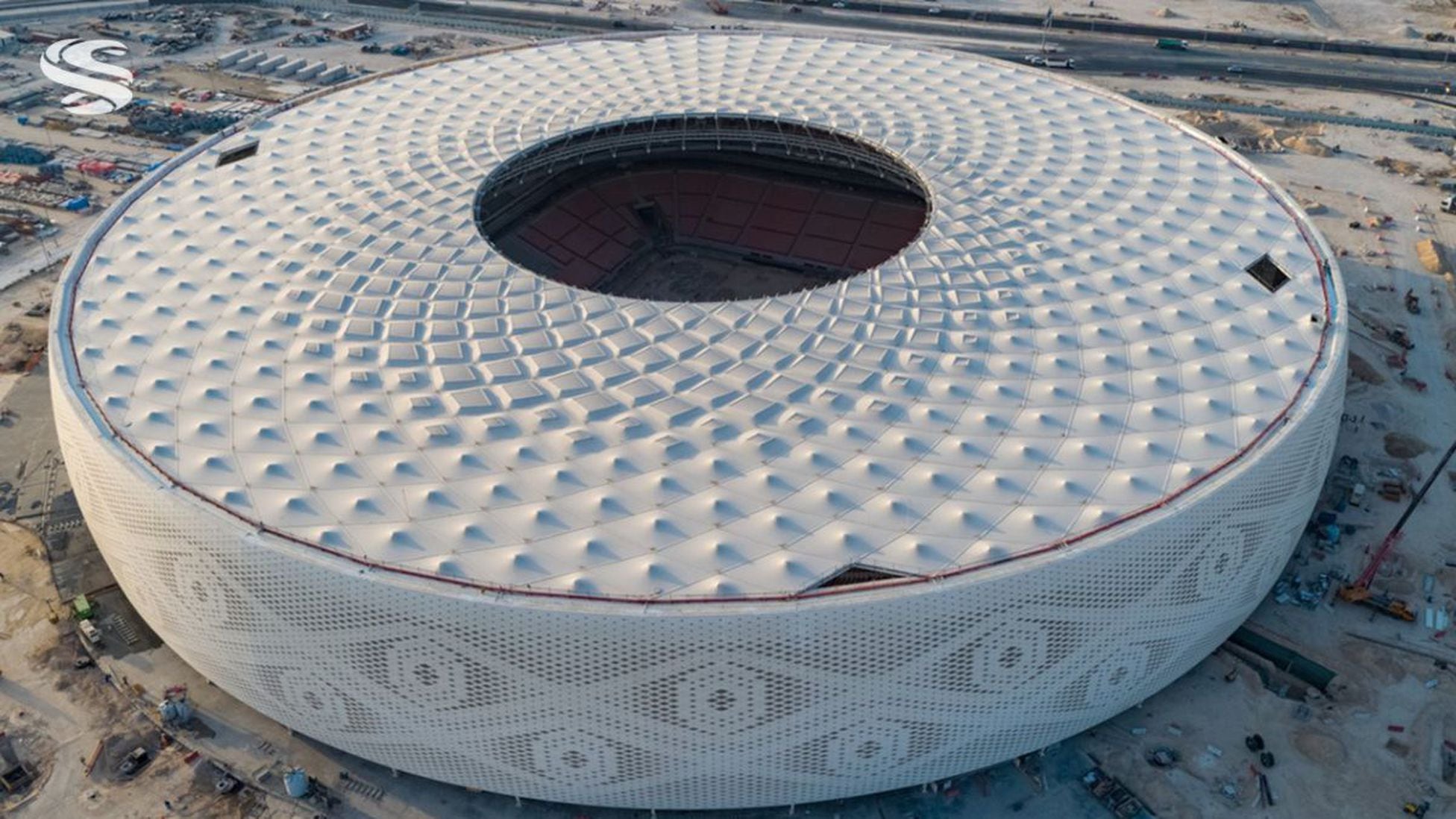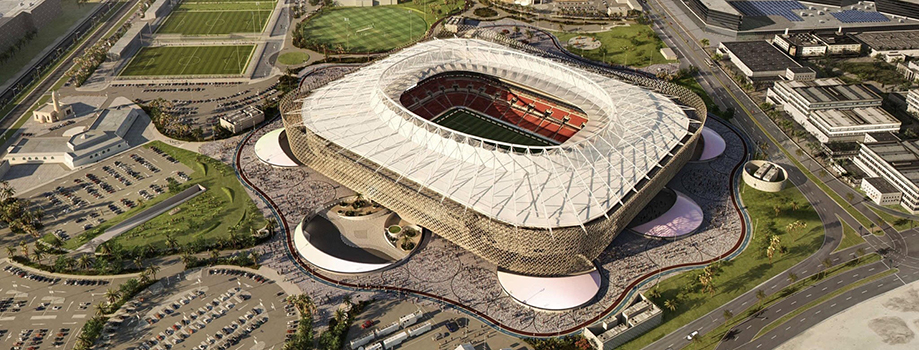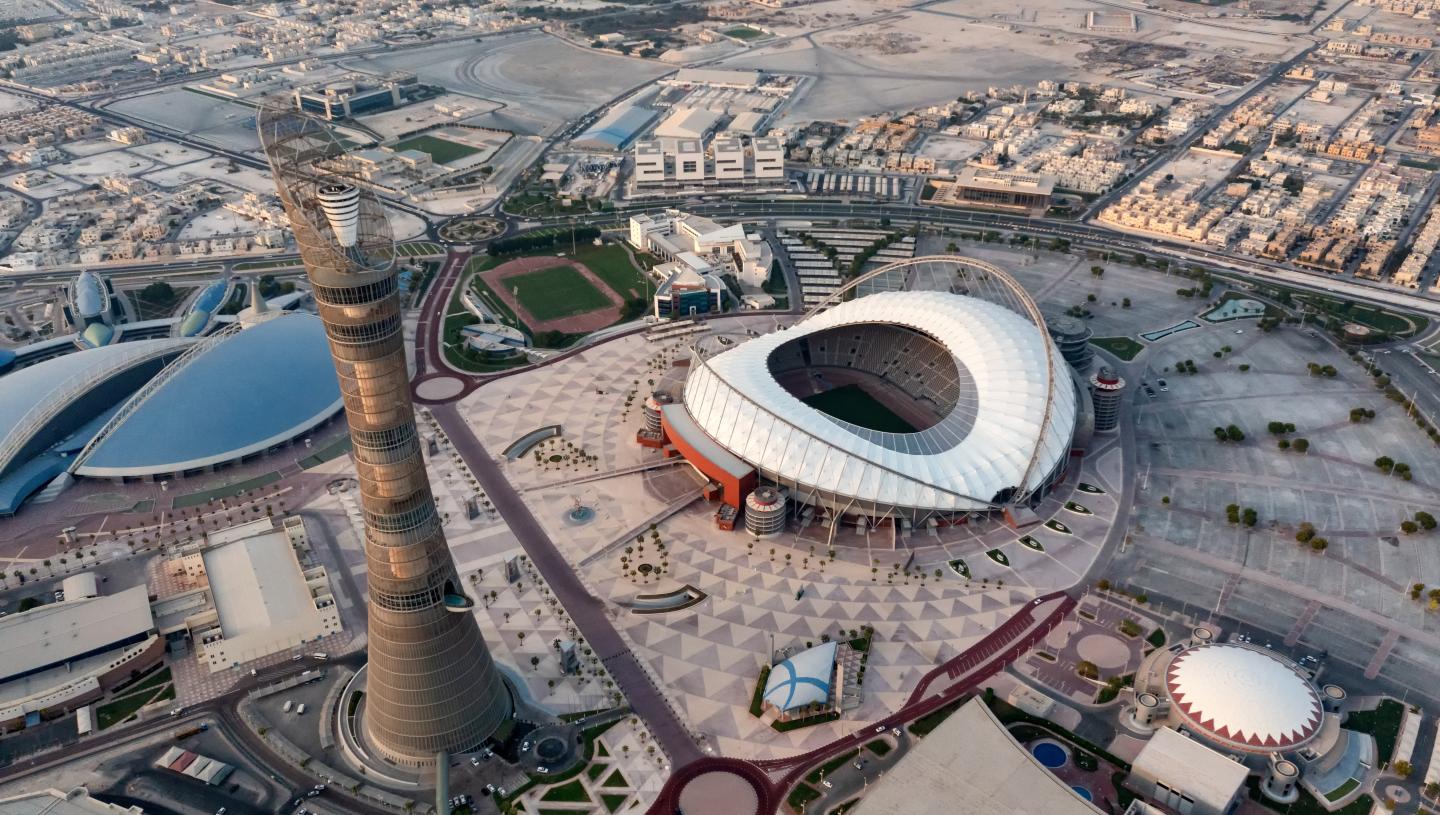FIFA World Cup 2022 -
General Event Information
Qatar
Where and when is the FIFA World Cup Qatar 2022™ being held?
Which teams are taking part?
What is the match schedule?
What are the official addresses of the FIFA World Cup Qatar 2022™ stadiums?
The only waterfront venue with a spectacular view of the Doha skyline, Stadium 974 was constructed using standard certified shipping containers and modular steel elements, echoing the nearby port and the industrial history of the plot.
The result is a distinctive, boldly colourful and thoroughly modern arena. The concept of the stadium was designed by Fenwick Iribarren Architects.
The stadium’s clever modular design meant that fewer normal building materials were required than in traditional stadium development, which helped keep construction costs down.
World Cup Matches
Stadium 974 will host seven matches during the FIFA World Cup, with six group games and one Round of 16 knockout match.
22 November Group C: Mexico v Poland (1900 local time)
24 November Group H: Portugal v Ghana (1900 local time)
26 November Group D: France v Denmark (1900 local time)
28 November Group G: Brazil v Switzerland (1900 local time)
30 November Group H: Poland v Argentina (2200 local time)
02 December Group G: Serbia v Switzerland (2200 local time)
05 December Round of 16: 1G v 2H (2200 local time)
Fans are able to access the venue by using the Doha Metro. Ras Bu Abboud Station (Gold Line) is located 800m away from the stadium. It is also in close proximity to the Doha Corniche and can be reached through the newly-developed pedestrian walkways.
The 40'000-tournament capacity stadium was unveiled during a digital launch in November 2021 and hosted its first match during the opening day of the FIFA Arab Cup Qatar 2021™ when the United Arab Emirates played Syria on 30 November 2021.
The first-ever FIFA complaint stadium that can be fully dismantled and re-purposed post-event.
This includes flexibility in the design to rebuild the stadium with the same capacity in a different location or build multiple smaller venues using the same materials.
The stadium received a 5-star rating from the Global Sustainability Assessment System (GSAS) for both its design and construction.
The stadium bowl seating avoids the need for air conditioning as it is designed to be naturally ventilated. The overall stadium steel structure can be recycled and reused post-tournament, based on any legacy option that is selected.
The stadium's water efficiency methods ensure it reduces water use by 40% compared to a conventional stadium development.
The stadium takes its name from ‘bayt al sha’ar’ – which were tents historically used by nomadic peoples in Qatar and the Gulf region.
The design honours Qatar’s past and present, while keeping one eye on the future of the community.
Covering an area larger than 30 football pitches, Al Bayt Park boasts vast green spaces with play areas and exercise stations, along with tracks for running, cycling, horse riding and camel riding.
In addition, the precinct is home to multi-sport grounds which are also open for public use. In November 2021, the Quodorat Centre, a community space for the preservation of cultural heritage and inter-generational dialogue, opened its new headquarters within the precinct, in partnership with the SC and Aspire Zone.
Led by Qatar's Ministry of Culture and Sport, a branch of the Nomas Centre will teach youth about the country's cultural heritage by organising a number of activities, including horse riding.
Al Bayt Stadium will host the opening match of the FIFA World Cup Qatar 2022™, along with numerous other games, including one semi-final.
20 November Group A: Qatar v Ecuador (1900 local time)
23 November Group F: Morocco v Senegal (1300 local time)
25 November Group B: England v USA (2200 local time)
27 November Group E: Spain v Germany (2200 local time)
29 November Group A: Netherlands v Qatar (1800 local time)
1 December Group E: Costa Rica v Germany (2200 local time)
4 December Round of 16: 1B v 2A (2200 local time)
10 December Quarter-final: W51 v W52 (2200 local time)
14 December Semi-final W59 v W60 (2200 local time)
The stadium was inaugurated on 30 November 2021 during the opening day of the FIFA Arab Cup Qatar 2021™.
The modular upper tier will be removed after the tournament, with the seats (tournament capacity 60,000) being re-purposed to create sporting facilities in Qatar and overseas. After Qatar 2022, the upper concourse of the stadium will be converted into various facilities.
The sky box level will be turned into a five-star hotel, while a shopping centre, food court, gym and multipurpose hall will be incorporated into the stadium building. A leading sports medicine hospital will open.
The stadium was awarded a five-star rating for its design and construction from the Global Sustainability Assessment System (GSAS), along with a Class A* rating for its construction process and a Seasonal Energy Efficiency Ratio Compliance certificate.
The stadium's design is inspired by the interplay of light and shadow that characterises the 'fanar' lantern.
Lusail's shape and facade echo the intricate decorative motifs on bowls and other vessels characteristic of the golden age of art and craftsmanship in the Arab and Islamic world.
Qatar’s biggest tournament venue (80,000 tournament capacity) will host the final, along with matches during every stage of Qatar 2022.
22 November Group C: Argentina v Saudi Arabia (1300 local time) 24 November Group G: Brazil v Serbia (2200 local time) 26 November Group C: Argentina v Mexico (2200 local time)
28 November Group H: Portugal v Uruguay (2200 local time) 30 November Group C: Saudi Arabia v Mexico (2200 local time) 2 December Group G: Cameroon v Brazil (2200 local time) 5 December Round of 16: 1H v 2G (12200 local time) 9 December Quarter-final: W49 v W50 (2200 local time) 13 December Semi-final: W57 v W58 (2200 local time) 18 December Final (1800 local time)
The stadium will be served by the Doha Metro Red Line. Drivers will be able to access the stadium by using the Al Khor Expressway. There will be a number of park and ride facilities in close proximity to the stadium. Post-2022, people will be able to reach the facility by using the Lusail Light Rail Tram.
The current plan for Lusail Stadium is to study the modification of the venue's interior space to house a mixture of civic facilities. Post-2022, the venue could feature affordable housing units, shops, food outlets, health clinics and even a school. The upper tier could be re-purposed into outdoor terraces for new homes and a community football pitch potentially built within the premises. To make way for these new amenities, some tournament installations will have to be removed. Any materials removed will be preserved and, where possible, re-purposed and donated to communities which require sporting infrastructure.
Sustainable building practices have been used throughout the construction. Recycled water is used to irrigate plants around the stadium. Water efficient fixtures and leak detection systems are operational. The construction site conserves 40% more fresh water than conventional stadium developments. The arena's roof has been designed with sustainability in mind.
A state-of-the-art material called Polytetrafluoroethylene (PTFE) protects the stadium from warm wind, keeps out dust and allows in enough light for the pitch to grow while providing shade to reduce the burden on the stadium’s air conditioning. Lusail Stadium has received a 5-star rating from the Global Sustainability Assessment System.
The stadium’s design represents the gahfiya – a traditional woven cap worn by men and boys across the Middle East.
The gahfiya forms a fundamental layer of the traditional clothing of the region. It is also a symbol of dignity and independence.
The stadium is set to host six group-stage matches along with a Round-of-16 match and one quarter-final.
21 November Group A: Senegal v Netherlands (1900 local time)
23 November Group E: Spain v Costa Rica (1900 local time)
25 November Group A: Qatar v Senegal (1600 local time)
27 November Group F: Belgium v Morocco (1600 local time)
29 November Group B: Iran v USA (2200 local time)
1 December Group F: Canada v Morocco (1800 local time)
4 December Round of 16: 1D v 2C (1800 local time)
10 December Quarter-final: W55 v W57 (1800 local time)
Al Thumama Stadium was inaugurated on 22 October 2021 when it hosted the Amir Cup final between Al Sadd and Al Rayyan.
Fans will be able to reach the venue using the Doha Metro and shuttle buses from the nearest station.
The stadium’s tournament capacity (40,000) will be reduced to meet local needs and provide quality sporting infrastructure to developing nations.
The remaining 20,000-seat arena will be used for football and other sporting events.
A branch of a sports clinic will open on site, as well as a boutique hotel, which will replace the stadium’s upper stands.
The precinct surrounding the stadium will become a community hub with facilities for multiple sports, including handball, volleyball, basketball and swimming. Tracks for running and cycling will weave their way around the precinct as well, providing an outlet for sportsmen and women of every stripe.
There will also be a number of retail and commercial units created to ensure the area becomes a bustling hub of exercise and activity.
The facade of the stadium features triangles that form complex, diamond-like geometrical patterns which appear to change colour with the sun’s movement across the sky.
Like diamonds, the stadium’s design represents quality, durability and resilience – and will become something to be treasured, both for the memories it holds and its future value to the country.
The stadium is set to host six group-stage matches along with a Round-of-16 game and one quarter-final.
22 November Group D: Denmark v Tunisia (1600 local time)
24 November Group H: Uruguay v Korea Republic (1600 local time)
26 November Group C: Poland v Saudi Arabia (1600 local time)
28 November Group H: Korea Republic v Ghana (1600 local time)
30 November Group D: Tunisia v France (1800 local time)
2 December Group H: Korea Republic v Portugal (1800 local time)
6 December Round of 16: 1F v 2E (1800 local time)
9 December Quarter-final: W53 v W54 (1800 local time)
The stadium was inaugurated in June 2020 during a virtual event that paid tribute to frontline healthcare workers during the coronavirus pandemic.
The precinct already features Education City Golf Club, which hosted the Qatar Masters - a European Tour event - for the first time in 2020. During legacy mode, the precinct will feature a retail area, conference centre, health and wellness facility, and two schools.
Fans will be able to reach the venue using the Doha Metro Green Line. Education City Station is located just 500 metres from the stadium.
The stadium's modular upper tier will be removed, with the seats donated to a country which lacks sporting infrastructure.
The stadium will become a sporting hub for the local community, including students and faculty.
The stadium is the first Qatar 2022 tournament venue to achieve a five-star design and build rating from the Global Sustainability Assessment System (GSAS).
Education City Stadium will feature state-of-the-art cooling technology for the benefit of fans, players and officials.
- Ahmad Bin Ali Stadium: Building number 306, Street 1700, Zone 51, Doha, Qatar
The stadium’s most striking feature is a glowing facade, comprised of patterns that characterise different aspects of the country: the importance of family, the beauty of the desert, the native lora and fauna, and local and international trade.
A fifth shape, a shield, brings together all the others, representing the strength and unity that is particularly relevant to the city of Al Rayyan.
The precinct will feature an array of sporting facilities, including cricket pitches, football pitches, a children's playground, outdoor gym facilities, an aquatics centre, tennis courts, a skate park and athletics track.
In addition, there will be landscaped parks, cafes and walkways, in addition to the Mall of Qatar, which opened in 2016 and is adjacent to the stadium.
The stadium (tournament capacity 40,000) is set to host six matches in the group stage and one in the Round of 16.
21 November Group B: USA v Wales (2200 local time)
23 November Group F: Belgium v Canada (2200 local time) 25 November Group B: Wales v Iran (1300 local time) 27 November Group B: Japan v Costa Rica (1300 local time) 29 November Group B: Wales v England (2200 local time) 1 December Group F: Croatia v Belgium (1800 local time) 3 December Round of 16: 1C v 2D (1800 local time)
The stadium was inaugurated on 18 December 2020 when it hosted the Amir Cup final.
Fans will be able to reach the venue using the Doha Metro. Al Riffa station, on the Green Line, is within walking distance of the stadium.
Home of Al Rayyan Sports Club. The modular upper tier will be removed after the tournament, with the seats being re-purposed into sporting facilities in Qatar and overseas.
Many of the materials from the deconstructed venue that once occupied this site – also named Ahmad Bin Ali Stadium – have been used in the new complex, including some which have been re-purposed into public art installations.
More than 90 per cent of the construction materials have been reused or recycled.
Trees that once surrounded the old venue have been retained for future replanting in order to minimise damage to the natural environment.
Energy and water efficiency measures have been embedded to further reduce the stadium's carbon footprint, while the Doha Metro connection will allow for seamless travel to and from the venue. The precinct will feature 125,000m² of green space, along with native, low-water consumption plants for the community to enjoy.
- Al Janoub Stadium: Building number 1707, Street 281, Zone 91, Doha, Qatar
The design is inspired by the sails of traditional dhow boats, in tribute to Al Wakrah’s seafaring past.
An innovative cooling system and retractable roof mean the stadium will be used all year round.
The stadium was designed by AECOM and Zaha Hadid Architects.
Al Janoub Park, within the precinct, opened in February 2020. It features cycling and running tracks, children's play areas and other green spaces. Eventually, there will be a marketplace and community facilities, including a mosque and school.
The stadium is set to host six group-stage matches along with one Round-of-16 match.
22 November Group D: France v Australia (2200 local time)
24 November Group G: Switzerland v Cameroon (1300 local time)
26 November Group D: Tunisia v Australia (1300 local time)
28 November Group G: Cameroon v Serbia (1300 local time)
30 November Group D: Australia v Denmark (1800 local time)
1 December Group H: Ghana v Uruguay (1800 local time)
5 December Round of 16: 1E v 2F (1800 local time)
The stadium was inaugurated on 16 May 2019 when it hosted the 2019 Amir Cup final.
Al Janoub Stadium is served by a network of new expressways and roads which provide easy access to residents and visitors to both Al Wakrah and Doha.
The stadium will be served by Al Wakrah station on the Red Line of the Doha Metro. The station is located 4.5km from the stadium and will be served by shuttle bus services on match days.
The precinct has dedicated bus stops, interconnected cycling paths and safe pedestrian routes.
A number of Qatari companies have been involved with the delivery of Al Janoub Stadium, including MIDMAC and PORR Qatar, Coastal, which has manufactured the stadium seats, and SOLB26, which has manufactured the steel required for the stadium. More than 50% of the investment to build the stadium has supported the Qatari economy.
Thanks to its modular nature, the stadium’s capacity will be reduced from 40,000 to 20,000 after the tournament, with the excess seats – from the upper tier – being donated to football development projects overseas.
- Khalifa International Stadium: Building number 51, Street 725, Zone 54, Doha, Qatar
The stadium’s dual arches remained intact following the redevelopment and have now been complemented by a wide canopy below which supports the stadium’s integration of the new cooling system.
The new tier added 10,450 seats to the capacity (tournament capacity 40,000), while the stadium now features a new facade. The new LED lighting system adds a new dimension to the fan experience.
The stadium is set to host six group-stage matches, one Round-of-16 game and the play-off for third place at Qatar 2022.
21 November Group B: England v Iran (1600 local time)
23 November Group E: Germany v Japan (1600 local time)
25 November Group A: Netherlands v Ecuador (1900 local time)
27 November Group F: Croatia v Canada (1900 local time) 29 November Group A: Ecuador v Senegal (1800 local time)
1 December Group E: Japan v Spain (2200 local time)
3 December Round of 16: 1A v 2B (1800 local time)
17 December 3rd Place (1800 local time)
Built in 1976, Khalifa International Stadium has hosted the Asian Games, Arabian Gulf Cup and AFC Asian Cup. In 2019, it hosted the IAAF World Athletics Championships, along with matches during the FIFA Club World Cup Qatar 2019™.
The stadium underwent an extensive redevelopment in order to prepare it for the FIFA World Cup Qatar 2022™.
The stadium is served by Sport City Station on the Doha Metro Gold Line.
The stadium lies in the heart of Aspire Zone – Qatar’s centre of sporting excellence which was the foundation of the 2006 Asian Games. The precinct is designed to drive participation in sport.
Aspetar sports medicine hospital, Aspire Dome (the world’s largest indoor multipurpose sports hall), Hamad Aquatics Centre and Aspire Park are all part of Aspire Zone. In addition, the stadium is just a stone’s throw from The Torch Doha Hotel and Villagio Mall.
The stadium was the first FIFA World Cup Qatar 2022™ venue to achieve Global Sustainability Assessment System (GSAS) certification.
Will public parking be available at the stadiums?
No. Public parking will not be available within the stadium grounds.
Are Accessibility Ticket customers entitled to obtain a parking pass?
Subject to availability, closer to the event all Accessibility Ticket holders who have been confirmed and successfully paid for their ticket(s) will receive a dedicated communication by FIFA informing how to collect a parking pass at one of the FIFA Ticketing Centres in Qatar, on a first come first served basis and free of charge.
For online and over the counter sales, Accessibility Ticket applicants are required to provide a valid proof of eligibility to benefit from an Accessibility Ticket and then be able to obtain a parking pass.
Then the parking pass will allow Accessibility Ticket holder to access a dedicated car park in the respective stadium.
What if my ticket is lost, destroyed or stolen?
FIFA World Cup 2022 Group A: What to expect with Netherlands and Senegal in pool
FIFA World Cup 2022 Group B: What to expect with England and USA in pool


